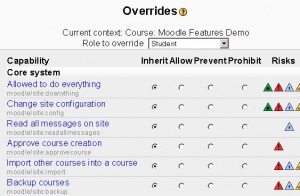Override permissions: Difference between revisions
John Isner (talk | contribs) m (emphasize that overriding a role actually creates a new role) |
John Isner (talk | contribs) No edit summary |
||
| Line 3: | Line 3: | ||
Overrides are specific permissions designed to override a role in a specific context, allowing you to "tweak" your permissions as required. When you override a role in a specific context, you are actually creating a new role. The new role is local to the context. When you assign a user to the role in that context, only that user is affected by your overrides. | Overrides are specific permissions designed to override a role in a specific context, allowing you to "tweak" your permissions as required. When you override a role in a specific context, you are actually creating a new role. The new role is local to the context. When you assign a user to the role in that context, only that user is affected by your overrides. | ||
[[Image:Roles OverRide tab.JPG|thumb|300px|left|Overrides page]]For example, users with the role Student can normally start new discussions in forums. Suppose there is one particular forum for which you want to restrict that capability for certain students. Within the forum, set an override that PREVENTS the capability for Students to "Start new discussions." Then assign selected students to the modified Student role. Students who have been assigned to the role will not be able to start discussions. | [[Image:Roles OverRide tab.JPG|thumb|300px|left|Overrides page]]For example, users with the role Student can normally start new discussions in forums. Suppose there is one particular forum for which you want to restrict that capability for certain students. Within the forum, set an override that PREVENTS the capability for Students to "Start new discussions." Then assign selected students to the modified Student role. Students who have been assigned to the role will not be able to start discussions. Others will be able to start discussions. | ||
Overrides can also be used to "open up" areas of your site and courses to give users extra permissions where it makes sense. For example, you may want to experiment giving Students the ability to grade some assignments. | Overrides can also be used to "open up" areas of your site and courses to give users extra permissions where it makes sense. For example, you may want to experiment giving Students the ability to grade some assignments. | ||
Revision as of 16:32, 24 May 2007
Template:Moodle 1.7
Overrides are specific permissions designed to override a role in a specific context, allowing you to "tweak" your permissions as required. When you override a role in a specific context, you are actually creating a new role. The new role is local to the context. When you assign a user to the role in that context, only that user is affected by your overrides.
For example, users with the role Student can normally start new discussions in forums. Suppose there is one particular forum for which you want to restrict that capability for certain students. Within the forum, set an override that PREVENTS the capability for Students to "Start new discussions." Then assign selected students to the modified Student role. Students who have been assigned to the role will not be able to start discussions. Others will be able to start discussions.
Overrides can also be used to "open up" areas of your site and courses to give users extra permissions where it makes sense. For example, you may want to experiment giving Students the ability to grade some assignments.
The interface is similar to the one for defining roles, except sometimes only relevant capabilities are shown, and you will also see some capabilities highlighted to show you what the permission for that role would be WITHOUT any override active (ie when your override is set to INHERIT).
